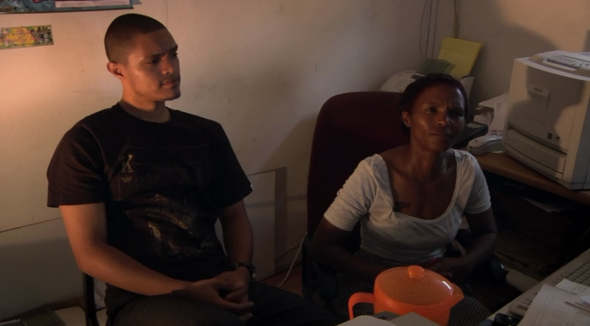The announcement of Trevor Noah’s ascendancy to Jon Stewart’s Daily Show throne has lots of people asking: Who is Trevor Noah? There’s no shortage of clips that show the South African comedian’s finely calibrated combination of showman’s charm and warm but incisive social commentary. But if you want to see where he comes from, the best way is the documentary You Laugh But It’s True, streaming now on Netflix and (for $1.99) on Vimeo on Demand.
David Paul Meyer’s 2011 movie (filmed in 2009) shows Noah still in the early days of his comedy career. The doc follows the comic as he prepares for his first one-man show in Johannesburg. Twenty-five years old at the time, Noah had only been working the stand-up scene for two years. But it shows why he is such an appealing figure—both for his comedic abilities and for what he represents.
Honestly, You Laugh But It’s True is not very funny. In fact, the film has more in common with many documentaries about hip-hop, focusing more on Noah’s rise from the inner city and from a background where he faced institutional prejudice than on his technical mastery. Stand-up comedy today gets a lot of attention for its artistic craftsmanship; this documentary, however, is all about identity, not artistry. Noah in 2009 was far from the consummate performer he is today: Even his own manager is shown having reservations. “There’s still so much more of his comedy that he could develop and improve on,” he says.
In the documentary, Noah shows himself as a master code-switcher. Unlike many of his South African contemporaries, he excels at performing for mixed audiences, and he is self-assured in his role as an ambassador abroad. But even when he isn’t being especially funny, he reveals a hunger for success and a vision of what he wants to represent. At his best, his work has what made Jon Stewart so powerful: He wields humor as a political instrument, but with surprising grace.
The film reveals the opposition that Noah faced in South Africa’s nascent stand-up scene, especially from older white comics. And it shows the double bind of his identity. His mixed-race background makes him a representative for the country as a whole and garners him a lot of attention, but it also means he is saddled with expectations and has to step up to the plate. In the end, the success of his comedic debut paved the way for an international audience, which has grown steadily since 2009 and has now brought him to Comedy Central.
One of the great things about You Laugh is that it shows the grim realities of struggling to make a name in comedy: quiet rooms, flubbed punch lines, and having to play corporate functions where you might be there for little more than filling time while the band tunes up. But it also shows what has consistently made Noah so magnetic: his onstage confidence, his good looks, and his pitch-perfect impersonations. Ultimately, the documentary highlights how Noah responds to having big responsibilities put on his shoulders—how he was able to rise to the occasion and shine. Now that he has to fill some of the largest shoes in the comedy world, that ability to show courage under pressure may prove to be his greatest strength.
